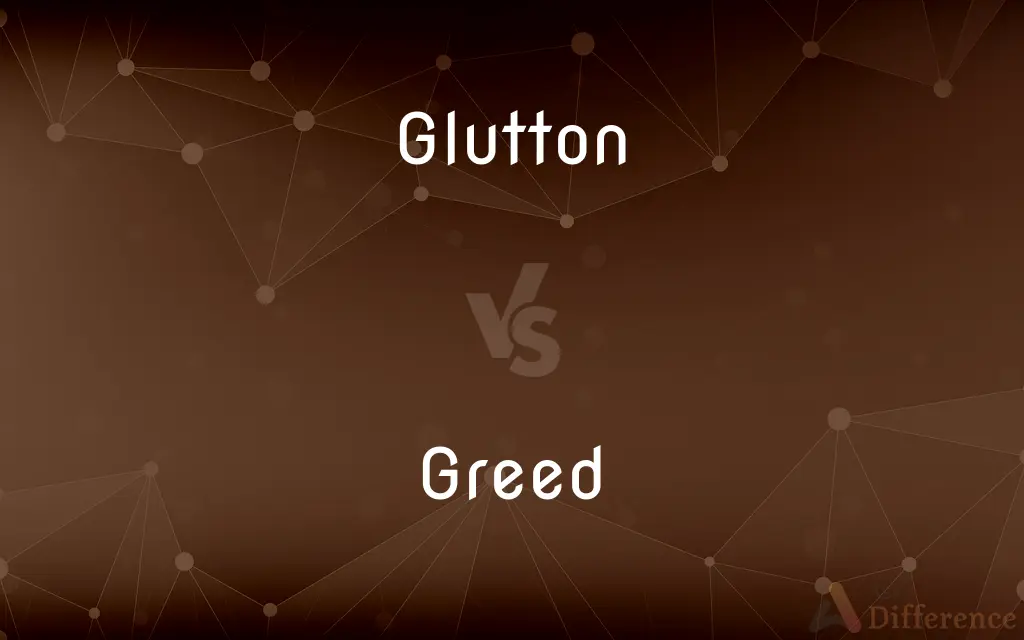Glutton vs. Greed — What's the Difference?
Edited by Tayyaba Rehman — By Maham Liaqat — Updated on April 6, 2024
Gluttony focuses on excessive consumption, especially of food or drink, while greed is an intense and selfish desire for something, like wealth or power.

Difference Between Glutton and Greed
Table of Contents
ADVERTISEMENT
Key Differences
Gluttony is characterized by an excessive and insatiable appetite for food and drink, often portrayed as a lack of self-control over the physical desire to consume. This term is typically used in contexts where the focus is on overindulgence in eating or drinking, highlighting a bodily excess. On the other hand, greed is a broader concept that denotes a deep and selfish desire to acquire more of something than is needed, not limited to material possessions like money, power, or status. While gluttony is specifically related to consumption, greed encompasses a wider range of desires and is often associated with a moral failing regarding excessive ambition or acquisitiveness.
While both gluttony and greed are considered negative traits or vices, they stem from different forms of excess. Gluttony is primarily associated with the physical act of consuming more food or drink than necessary, often leading to health issues or social disapproval. It is seen as an indulgence in one’s appetites to the point of waste. In contrast, greed focuses on an insatiable desire for accumulation, whether it be of wealth, resources, or possessions, and is often linked to a lack of consideration for others. Greed can drive individuals to unethical behavior, prioritizing accumulation over social or moral responsibilities.
The social and personal consequences of gluttony and greed also differ. Gluttony's effects are often immediate and personal, affecting one’s health and well-being due to overconsumption. It can also lead to social stigma or judgment from others who view such behavior as wasteful or indicative of poor self-control. Greed, however, has broader implications, affecting not only the individual but also the larger community. It can lead to economic disparities, exploitation, and corruption, as the desire for more resources or power often comes at the expense of others.
Gluttony and greed are both frowned upon but are depicted and criticized in different contexts. Gluttony is often addressed within the framework of personal health and moral discipline, particularly in discussions about consumerism and physical well-being. Meanwhile, greed is critiqued in economic, political, and social discussions, highlighting its impact on societal inequality, exploitation, and the ethical implications of unchecked ambition.
Despite their differences, gluttony and greed both reflect themes of excess and lack of moderation. Gluttony illustrates this through the lens of consumption and physical appetites, emphasizing the consequences of indulgence on personal health and societal resources. Greed, conversely, showcases excess in the pursuit of wealth, power, or status, underlining the moral and social repercussions of such behavior. Both terms serve as cautionary concepts, warning against the dangers of excess in different facets of human experience.
ADVERTISEMENT
Comparison Chart
Definition
Excessive indulgence in food and drink.
Intense and selfish desire for something, especially wealth, power, or possessions.
Primary Focus
Physical consumption.
Accumulation of wealth, resources, or power.
Context of Application
Often related to eating and drinking.
Can apply to various desires, including money, power, and status.
Social Consequences
Can lead to health issues and social disapproval.
Leads to economic disparities, exploitation, and potentially unethical behavior.
Moral or Ethical Aspect
Seen as a lack of self-control and discipline.
Associated with selfishness and disregard for the welfare of others.
Compare with Definitions
Glutton
Overindulgence in Food.
The feast was an invitation for gluttony, with more dishes than the guests could possibly eat.
Greed
Insatiable Desire for Wealth.
His greed led him to prioritize his work over his family and friends.
Glutton
Embodiment of Excess.
In many stories, the character of the glutton serves as a cautionary tale against excess.
Greed
Social and Economic Impact.
Greed contributes to economic disparities and social injustice.
Glutton
Excessive Eater.
He became known as a glutton after participating in numerous eating contests.
Greed
Drive for Accumulation.
The corporate executive's greed was evident in his ruthless business practices.
Glutton
Lack of Moderation.
Her gluttony at the buffet was noticeable, as she piled her plate high with food multiple times.
Greed
Moral Failing.
Greed is often seen as a moral failing, reflecting a lack of empathy and ethical values.
Glutton
Subject to Criticism.
Gluttons often face social criticism for their perceived lack of self-control.
Greed
Root of Unethical Behavior.
It was greed that drove the politician to accept bribes.
Glutton
An excessively greedy eater.
Greed
Greed (or avarice) is an uncontrolled longing for increase in the acquisition or use of material gain (be it food, money, land, or animate/inanimate possessions); or social value, such as status, or power. Greed has been identified as undesirable throughout known human history because it creates behavior-conflict between personal and social goals.
Glutton
Old-fashioned term for wolverine
Greed
Intense and selfish desire for something, especially wealth, power, or food
The colonists' greed for African land
Mercenaries who had allowed greed to overtake their principles
Greed has taken over football
Glutton
A person who eats or consumes immoderate amounts of food and drink.
Greed
An excessive desire to acquire or possess more than what one needs or deserves, especially with respect to material wealth
"Many ... attach to competition the stigma of selfish greed" (Henry Fawcett).
Glutton
A person with an inordinate capacity to receive or withstand something
A glutton for punishment.
Greed
A selfish or excessive desire for more than is needed or deserved, especially of money, wealth, food, or other possessions.
His greed was his undoing.
Glutton
See wolverine.
Greed
To desire in a greedy manner, or to act on such a desire.
Glutton
Gluttonous; greedy; gormandizing.
Greed
An eager desire or longing; greediness; as, a greed of gain.
Glutton
One who eats voraciously, obsessively, or to excess; a gormandizer.
Such a glutton would eat until his belly hurts.
Greed
Excessive desire to acquire or possess more (especially more material wealth) than one needs or deserves
Glutton
(figuratively) One who consumes voraciously, obsessively, or to excess
Glutton
The wolverine, Gulo gulo.
Glutton
(archaic) To glut; to satisfy (especially an appetite) by filling to capacity.
Glutton
(obsolete) To glut; to eat voraciously.
Glutton
One who eats voraciously, or to excess; a gormandizer.
Glutton
Fig.: One who gluts himself.
Gluttons in murder, wanton to destroy.
Glutton
A carnivorous mammal (Gulo gulo formerly Gulo luscus), of the weasel family Mustelidæ, about the size of a large badger; called also wolverine, wolverene and carcajou. It was formerly believed to be inordinately voracious, whence the name. It is a native of the northern parts of America, Europe, and Asia.
Glutton
Gluttonous; greedy; gormandizing.
A glutton monastery in former ages makes a hungry ministry in our days.
Glutton
To glut; to eat voraciously.
Gluttoned at last, return at home to pine.
Whereon in Egypt gluttoning they fed.
Glutton
A person who is devoted to eating and drinking to excess
Glutton
Wolverine of northern Eurasia
Common Curiosities
Can gluttony affect one’s health?
Yes, gluttony can lead to negative health outcomes due to overconsumption of food and drink.
Are there positive aspects to gluttony or greed?
While typically viewed negatively, some argue that these traits can drive ambition or enjoyment in moderation.
Is greed always related to money?
No, greed can relate to an intense desire for various forms of wealth, including power, status, or possessions, not just money.
Can greed drive innovation?
Some argue that a desire for more can motivate individuals to innovate, though this perspective is controversial.
Why is greed considered a moral failing?
Greed is seen as a moral failing because it involves selfishly desiring more than one needs, often at the expense of others.
Can greed lead to legal problems?
Yes, greed can lead to unethical or illegal actions, such as fraud or corruption, resulting in legal consequences.
Can gluttony be a symptom of underlying issues?
Yes, in some cases, gluttony may reflect emotional or psychological issues, such as stress or depression.
How do religious teachings generally view greed?
Many religious teachings condemn greed, viewing it as a source of social injustice and moral corruption.
What differentiates gluttony from other forms of overindulgence?
Gluttony specifically refers to excessive eating and drinking, unlike other vices that might involve different forms of excess.
How does greed affect relationships?
Greed can strain or damage relationships, as it often leads to prioritizing personal gain over the well-being of others.
How do societies address gluttony?
Societies often address gluttony through health education, promoting moderation and balanced lifestyles.
Is gluttony limited to physical food?
Traditionally, yes, though metaphorically, it can sometimes refer to excessive indulgence in non-material things.
Are there cultural differences in how gluttony and greed are viewed?
Yes, cultural perceptions of gluttony and greed can vary, with some cultures more tolerant of indulgence and others emphasizing restraint.
Is it possible to overcome gluttony or greed?
Yes, with self-awareness and effort, individuals can learn to manage these tendencies through moderation and ethical living.
How do gluttony and greed influence societal values?
These vices can reflect and reinforce societal attitudes towards consumption, wealth, and ethical behavior, influencing cultural and economic policies.
Share Your Discovery

Previous Comparison
Timer vs. Counter
Next Comparison
Hull vs. ShellAuthor Spotlight
Written by
Maham LiaqatEdited by
Tayyaba RehmanTayyaba Rehman is a distinguished writer, currently serving as a primary contributor to askdifference.com. As a researcher in semantics and etymology, Tayyaba's passion for the complexity of languages and their distinctions has found a perfect home on the platform. Tayyaba delves into the intricacies of language, distinguishing between commonly confused words and phrases, thereby providing clarity for readers worldwide.















































